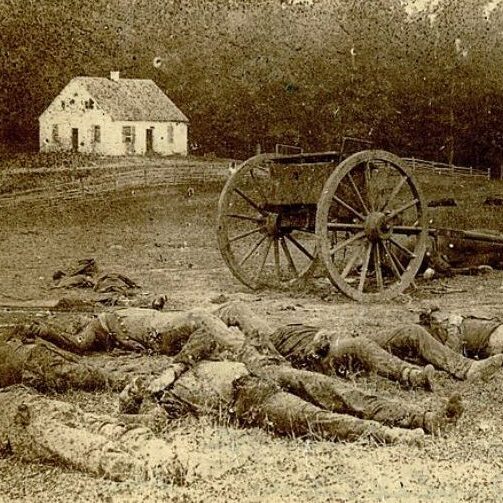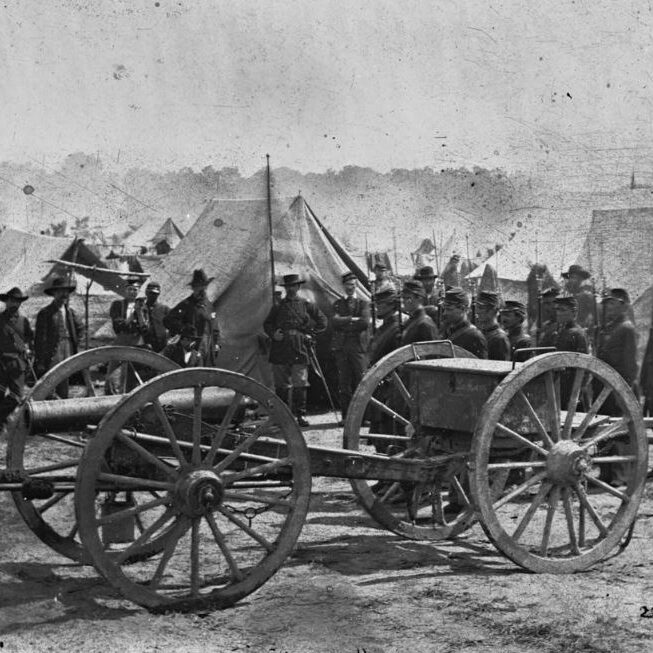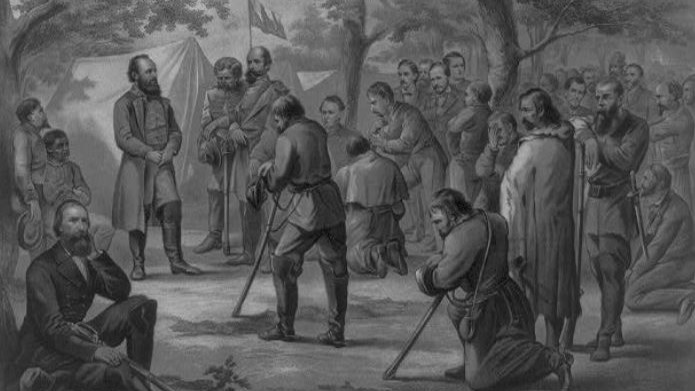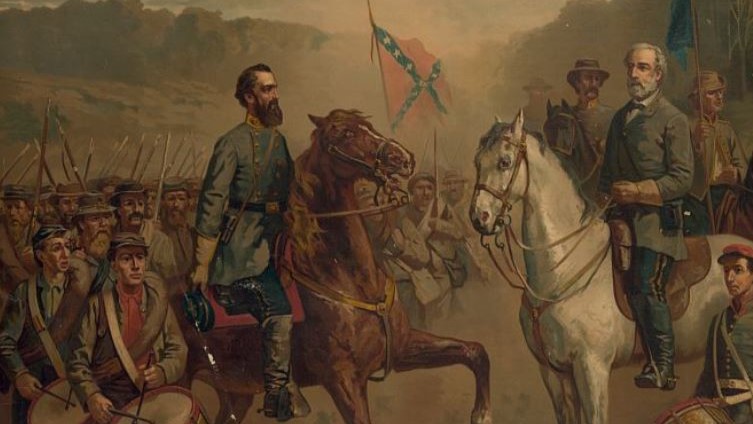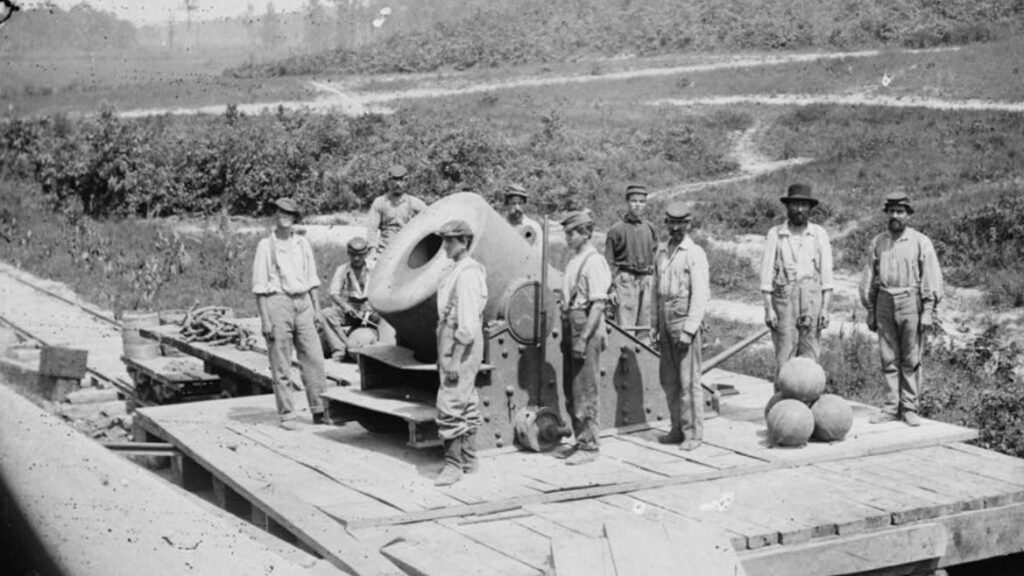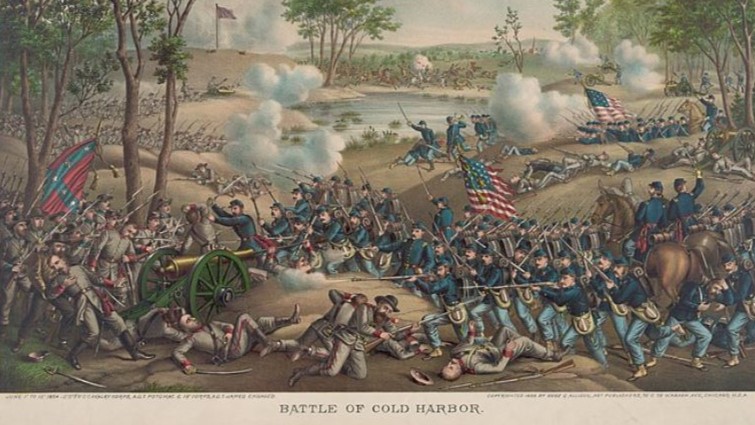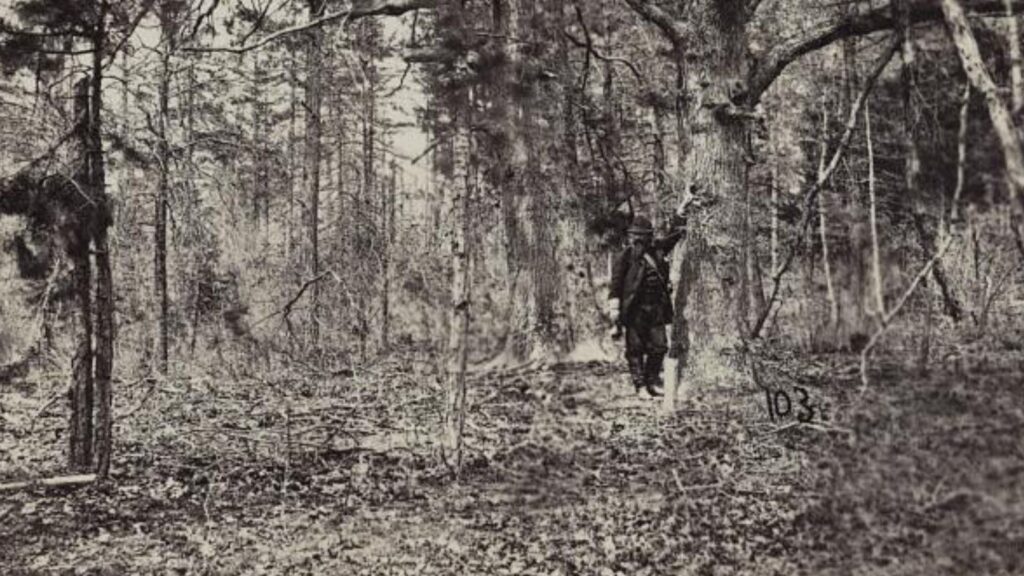Robert E. Lee’s Confederate forces had invaded Maryland and the Union Army, led by George B. McClellan, was tasked to cut them off. On September 17th, brutal fighting erupted near Sharpsburg and Antietam became remembered as the single bloodiest day in American military history.
However, the Battle of Antietam ended in stalemate. Despite the stalemate, the sheer number of Confederate casualties forced General Lee’s retreat from Maryland.
But what if McClellan had seized the day? What if he routed Lee’s forces? Could such a momentous Union triumph have upended the Civil War’s trajectory? Might it have ended the bloodshed sooner?
1. McClellan’s Shortcomings at Antietam
McClellan’s performance at Antietam highlighted his overcautious nature.
He was too tentative in his leadership. Despite superior numbers, he failed to commit all his forces. His strategies also allowed gaps in his line that nearly proved disastrous.
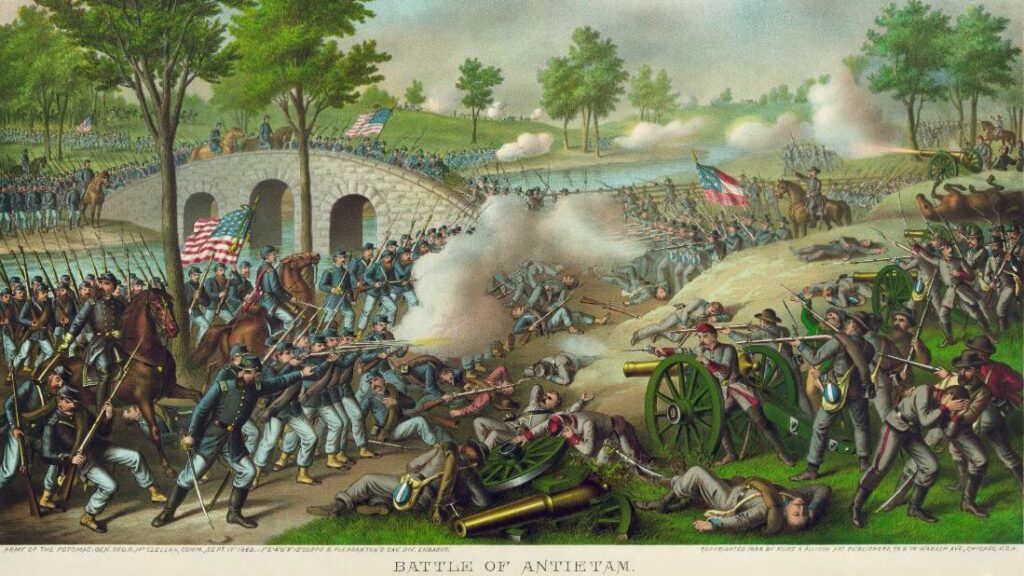
Yet McClellan showed no appetite for a decisive blow.
The battle had been fought to a stalemate. But Lee’s troops were battered and low on ammunition. The sheer number of Confederate casualties forced General Lee’s retreat from Maryland. The Potomac River blocked their retreat.
All signs pointed to an opportunity to crush the Confederate retreat, but McClellan did not press the attack.
For over 18 hours after the fighting ended, McClellan merely watched.
When he finally acted, it was too late. Lee had expertly disengaged and slipped his forces back across the Potomac. McClellan’s indecisiveness squandered a prime chance for victory.
In his eyes, any chance for an offense at this stage was too risky. He seemed satisfied to force the rebels out of Maryland. But his lack of audacity allowed Lee’s invasion to survive.
The opportunity was there at Antietam. McClellan had the benefit of superior numbers and position. Yet his overcautious leadership failed to deliver a decisive blow.
2. Military Repercussions for the Confederacy
A decisive Union victory at Antietam could have inflicted crippling military losses.
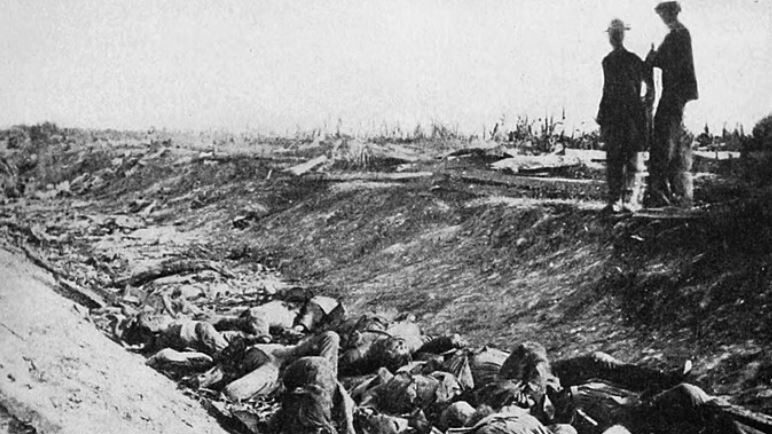
Lee’s outnumbered invasion force was already reeling. His troops were exhausted and low on munitions. A vigorous pursuit may have captured or killed many Confederates.
At this stage the Confederacy resources were already stretched thinly. Such losses may have prevented further Southern offensives for some time.
Antietam already proved incredibly bloody for Confederate forces. But a complete rout would have shattered Lee’s formidable offensive capabilities. This would could have limited their ability to continue the war.
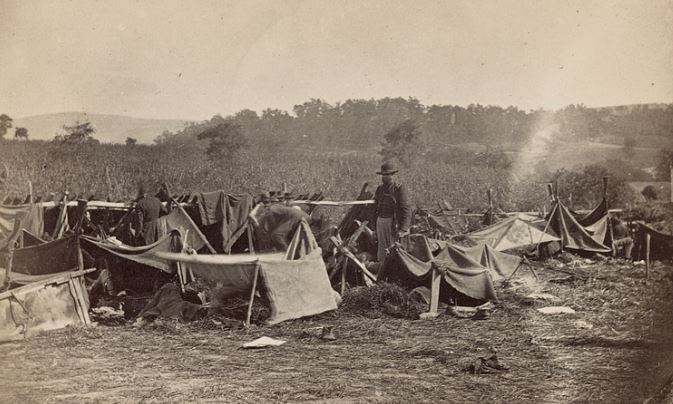
Shattered Southern Morale
The psychological blow may have proven damaging for Southern morale.
Demoralization may have sapped the Confederacy’s offensive spirit for months or years. Troops could lose faith in an ultimate victory after such a disaster. The Southern public may also question whether the sacrifices were worth continuing the struggle.
What if General Lee was Captured or Killed at Antietam?
The capture or death of Robert E. Lee at Antietam in 1862 would have sent shockwaves through the Civil War.
He was their most skilled military mind, and his absence would have created a massive leadership vacuum. Replacing his strategic thinking and experience would have been incredibly difficult.
News of Lee’s demise would have dealt a severe blow to Confederate morale. Desertions and draft resistance could have increased significantly.
Guerrilla Warfare
Antietam’s carnage would leave the South reeling. Replacing those lost men would be a monumental task. The Confederacy already faced manpower shortages, and refilling the ranks would be even harder with fewer Southern men of fighting age available.
Lee’s once-mighty Army of Northern Virginia, a juggernaut that had terrified the Union, would be a shadow of its former self. Reduced to a defensive force, they’d be primarily concerned with protecting Richmond, the Confederate capital.
With Virginia overrun by Union troops, the South would likely be forced to shift tactics. Large-scale field battles might become a thing of the past. Guerilla warfare, a brutal and unpredictable style of fighting, could become more prevalent. Imagine smaller, surprise attacks by Confederate holdouts against Union supply lines and troop movements.
The Battle for the West
With Lee’s army neutralized, the Union could have shifted resources to other theaters of the war.
This could have allowed them to put more pressure on the Confederacy in the west and along the Mississippi River, potentially leading to faster Union victories at locations, such as, Vicksburg.
3. Strategic Advantages of a Union Victory at Antietam
A decisive Union victory at Antietam would have immensely boosted Northern morale. Smashing Lee’s invasion could have reinvigorated public confidence in ultimate triumph, as fears of a prolonged, bloody stalemate may dissipate. This would give the Union significant advantages.
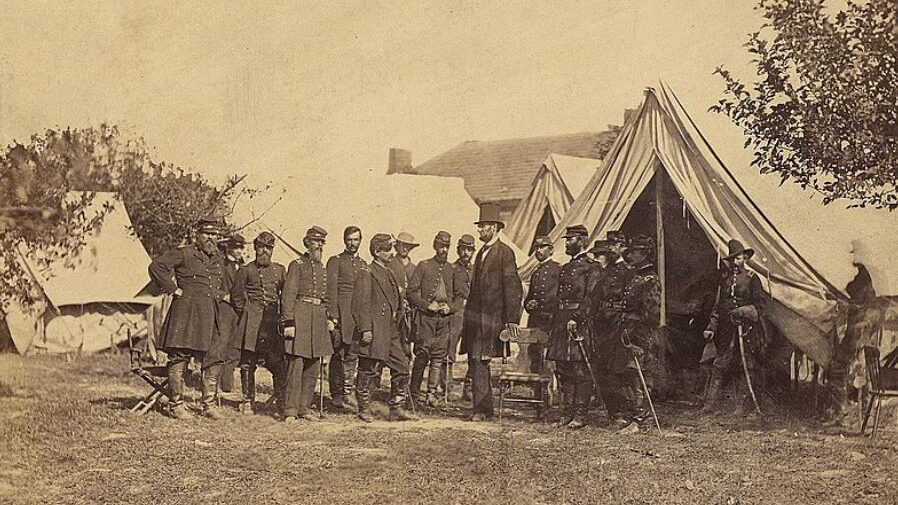
A Move on Richmond
Such a morale boost may have empowered Lincoln’s administration. They could pursue a more aggressive military strategy with public backing.
Resources and recruits may have flowed more freely with the revived spirit.
Seizing the initiative, the Union could move to make another strike at Richmond while reeling Confederates regrouped.
Opportunities may have opened to sever supply lines and railways. Logistically, a decisive Antietam win could give the Union control of western Maryland and the crucial B&O railroad as a supply line.
Staging grounds around Harpers Ferry would also become readily usable.
The Confederate capital could then be encircled and besieged with renewed northern momentum. The remnants of the Confederate force may struggle to quickly replenish and regroup in time to save Richmond.
The Union’s Military Resources
The Union’s superiority in resources and manufacturing capacity would also be maximized without facing incursions.
Military resources get untethered from constantly defending Washington D.C.’s surroundings.
More forces could now join the offensive efforts across Virginia. Other campaigns could receive reinforcements and materiel diverted from watching the Washington’s rear.
A decisive Antietam victory realistically tilts the strategic balance towards the Union. A ruthless follow-through could potentially end the siege of Richmond months or years earlier.
4. Political Ramifications of a Antietam Victory for the Union
A decisive Antietam victory gifts Lincoln tremendous political capital.
Domestic Politics
His leadership is vindicated after much criticism. Anti-war Democrats’ voices are marginalized and domestic opposition to the war effort could crumble with such a landmark triumph.
Whilst public enthusiasm reinforces Lincoln’s ambitious Emancipation goals.
With military fortunes turning, border states may solidify their Union ties and wavering regions see renewed incentives to side with victors. Meaning, areas under Confederate occupation could more rapidly return to federal control.
The building blocks of post-war reconciliation could then establish earlier.
International Relations
Most crucially, the battlefield reality discourages European powers from recognizing the Confederacy.
Britain and France’s threat of intervention evaporates after a Confederate rout. No nation wishes to back an apparently doomed insurrection.
The international community would no longer view the Confederacy as a viable nation-in-waiting.
Manufacturing and financial support from overseas withers as depleted Confederates retreat and their hopes for foreign assistance dissipate. Crucial trade with Britain would then cease flowing through Southern ports.
European interests would then align with a reunited American Republic. This would signal the death knell for Confederate dreams of nationalist legitimacy.
A decisive Antietam defeat for Lee strengthens Lincoln’s leadership and forecloses Confederate ambitions for widespread international recognition.
5. McClellan Remains in Command
A decisive victory at Antietam alters McClellan’s fortunes dramatically.
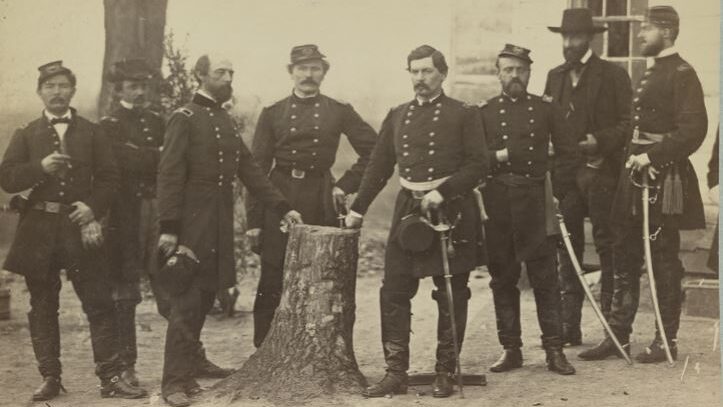
The bloody stalemate led Lincoln to eventually relieve him of command. But a clear-cut conquest of Lee’s forces changes that trajectory. The administration would have little justification for McClellan’s removal with such a pivotal win at Antietam.
McClellan would likely keep leadership of the Army of the Potomac into 1863.
McClellan believed decisive victories required overwhelming numbers. However, his sluggish pursuit after Antietam demonstrated an inability to deliver a fatal blow. Even with advantage, McClellan seemed inclined to maneuver rather than aggressively attack.
These flaws may continue to persist.
Momentum from Antietam’s massive boost could stall across 1863 without sustained pressure. Critics argued McClellan too frequently surrendered initiative in over-preparation.
Lincoln could grow impatient awaiting another overly-calculated offensive plan while the South regroups. Further delays solidifying Northern advantages might prove unacceptable for an emboldened administration.
Conversely, such a monumental triumph on his greatest stage could instill overdue confidence for McClellan.
Perhaps McClellan applies the lessons absorbed after previous failures. An audacious campaign could finally materialize.
While retained for the short-term, McClellan’s future may prove limited without a philosophical shift. His overcaution threatens to undermine a decisive Antietam victory’s hard-won advantages in the years ahead.
6. A War Reshaped, But Not Ended
A decisive Union victory at Antietam, with Lee’s army shattered and the iconic General himself captured, would have fundamentally altered the Civil War’s trajectory.
The South’s morale would have plummeted, potentially swaying European powers and bolstering Lincoln’s government. The Union army, freed from the immediate threat of Lee, could have pressed further into Virginia, perhaps even striking towards Richmond.
However, achieving total victory wouldn’t have been guaranteed.
McClellan’s cautious nature might have limited his pursuit. The South’s will to fight for independence may have remained strong. Guerrilla warfare and continued resistance in other theaters could have also dragged on the war.
Antietam would have been a turning point, but not necessarily the war’s final act. The road to ultimate victory, though smoother, would still be long and arduous.
Further Reading
If you enjoyed this article, you may be interested to read more about the American Civil War events, or perhaps read about the how the North won the war or what would have happened had the South won. Read here for more general American history.

